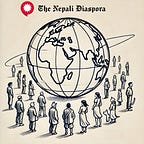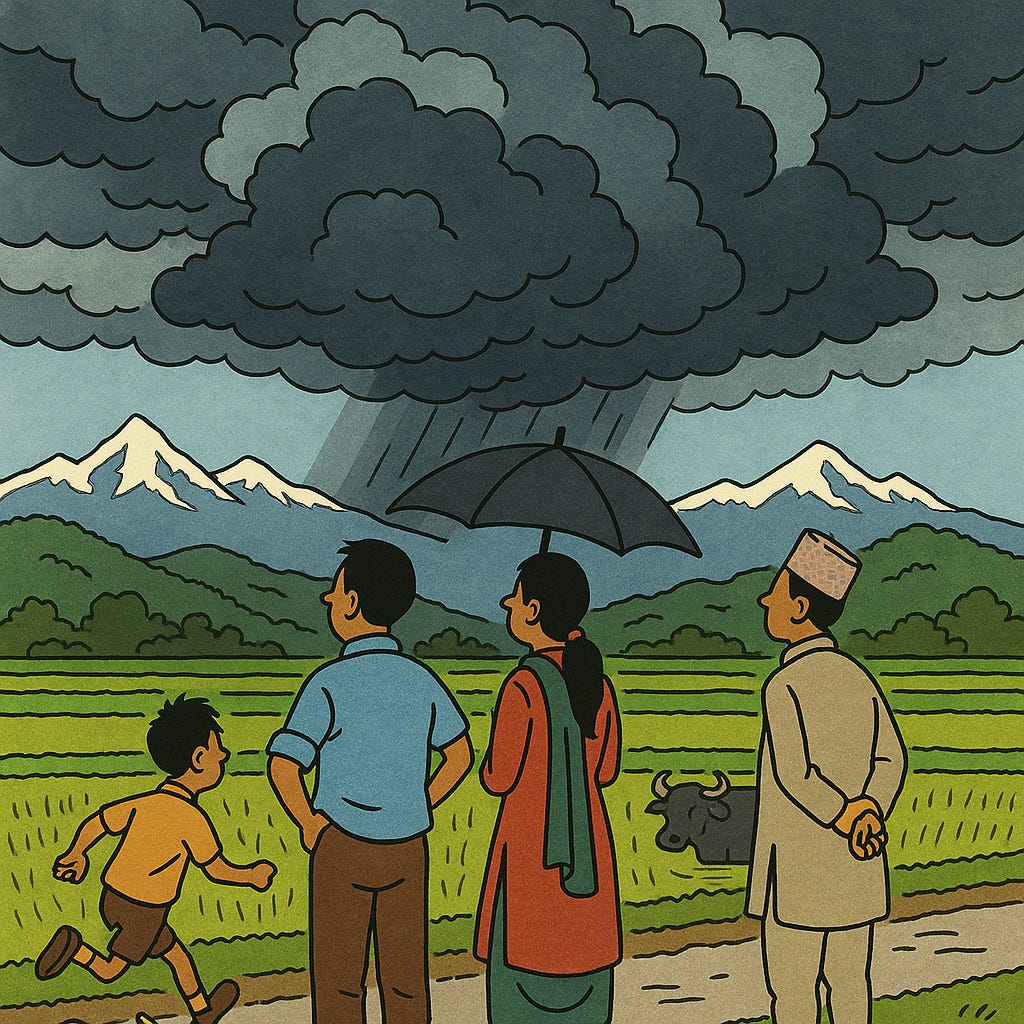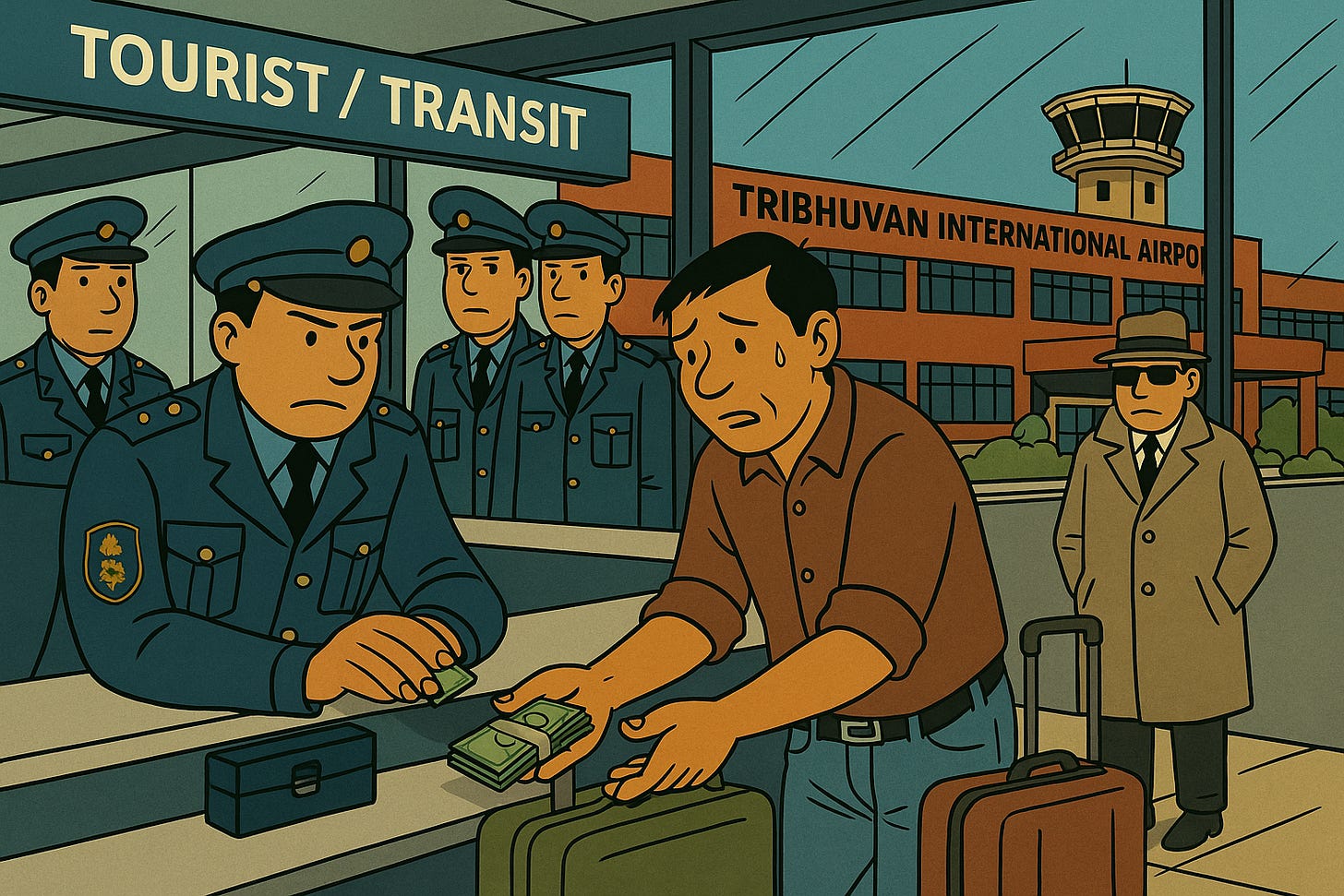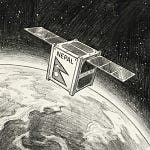Share the love! Help others that care about Nepal stay up to date the easy way. If you like this issue, share it with a friend who follows Nepal and hit Subscribe for your weekly dose of curated, can’t-miss updates.
From record-breaking monsoon forecasts to eyebrow-raising exports (yes, we’re still talking about soybean oil), Nepal’s been busy—both at home and abroad. With immigration scandals, fresh FDI promises, and heartbreaking diaspora stats, this week’s stories remind us: whether it’s governance or Gulmi birds, the details matter—and so do the people behind them. Let’s dive in.
Economy & Development 💸
Nepal has recorded a 33 percent surge in foreign direct investment (FDI) commitments, reflecting recent legal and policy reforms aimed at improving the investment climate. As reported by KTM Post, pledges worth Rs 56.78 billion have been made across 565 projects in the first ten months of the current fiscal year—a jump attributed to streamlined approvals and a broadened definition of large-scale industries. Notably, 274 projects were registered under the newly expanded “automatic route,” enabling faster clearance, especially in the ICT and tourism sectors. However, actual inflows remain modest—only Rs 8.96 billion has entered the country in equity so far. Experts caution that governance challenges and institutional trust continue to limit Nepal’s ability to convert commitments into tangible investments. A study cited by KTM Post warns that even a 1% rise in corruption can reduce FDI inflows by over 9%, underscoring the importance of transparency and regulatory reform.
While FDI commitments are up, exports have also surged—but not without raising eyebrows. A dramatic 72.7% increase in total exports this fiscal year has been largely fueled by the re-export of refined edible oils to India. Nepal imported crude oils from Argentina, Ukraine, and Southeast Asia, refined them locally, and exported over Rs 90 billion worth of soybean and sunflower oil under SAFTA’s zero-duty provision. As detailed by KTM Post, Indian trade bodies have questioned whether these meet the 30% value-addition rule. Some Nepali experts admit the process often involves little more than repackaging—raising concerns about sustainability, regulatory loopholes, and the long-term integrity of bilateral trade.
Meanwhile, the broader economic picture remains complex. Business leaders are urging the government to declare the next ten years an “investment decade,” with tax relief and budget reforms to stimulate production and job creation, reports THT. Exports of traditional goods like tea rose 46%, though cardamom slipped slightly. On the fiscal side, public debt has reached Rs 2.62 trillion, now over 42% of GDP, driven by unproductive spending and persistent budget deficits Republica. A sharp commentary in Republica draws from Kautilya’s Arthashastra to critique Nepal’s chronic underinvestment in infrastructure. It calls for better fiscal discipline, stronger project oversight, and a shift from recurrent to capital spending if Nepal is to secure long-term, sustainable growth.
Politics & Governance 🪧
A sweeping bribery and extortion scandal at Tribhuvan International Airport has exposed deep-rooted corruption within Nepal’s immigration system, implicating high-level officials and political appointees. Investigations by the CIAA revealed that immigration officers were extorting outbound travellers, collecting up to Rs 300,000 per person, particularly from those heading to the Gulf and Europe. Funds were allegedly funneled under the guise of payments to top political leaders. Aides embedded in the Home Ministry—most notably Bimal Paudel and Ganesh Ojha—are accused of orchestrating the scheme, using their influence to control staffing and visa approvals. The CIAA raided the airport office last week, arresting Joint Secretary Tirtha Raj Bhattarai and seizing records and devices. At least eight staff members were immediately transferred, and nine others have now been summoned for further questioning Nepal News. The scandal reflects not just individual misconduct but a broader institutional failure—with human trafficking networks reportedly benefiting from years of impunity.
At the same time, Nepal Rastra Bank has entered a new era with the appointment of Dr Biswo Nath Poudel as Governor. Backed by the Nepali Congress and confirmed after a Supreme Court challenge was dismissed, Poudel steps into the role amid sluggish growth and mounting debt. As reported by Republica and Nepal News, he brings a solid academic résumé—but not without political baggage, having run as a Congress candidate in 2022 and initially served on the selection committee that endorsed him. His stated priorities include tightening financial oversight, boosting capital market morale, and removing Nepal from the FATF grey list. Shortly after taking office, he reassigned departmental portfolios among deputy governors—a move aimed at streamlining operations Republica.
Meanwhile, other governance battles are brewing. Top bureaucrats are lobbying to scrap a proposed two-year “cooling-off” period that would prevent civil servants from immediately transitioning into political appointments—a change some warn could deepen partisanship within the civil service KTM Post. An opinion in Nepal News highlights how “policy corruption”—where Cabinet decisions remain immune to CIAA scrutiny—continues to shield powerful actors from accountability. On the political front, royalist groups are preparing for a “decisive agitation” to reinstate the monarchy, prompting the government to warn it may impose restrictions if protests escalate KTM Post. Meanwhile, the Supreme Court upheld the custody of Rabi Lamichhane in a cooperative fraud case exceeding Rs 100 million, meaning he remains in jail until trial KTM Post. And in a quieter but significant financial move, the government plans to issue infrastructure bonds targeted at insurance companies, a step aimed at drawing long-term private capital into development Republica.
Social & Cultural ⭐
Most parts of Nepal are expected to receive above-average rainfall this monsoon season, coupled with warmer-than-usual temperatures, according to new forecasts from the Department of Hydrology and Meteorology. As reported by THT and KTM Post, the seasonal outlook shows a 55–65% likelihood of heavy rains in regions like Karnali, Lumbini, and Gandaki provinces. With the monsoon possibly arriving early, disaster authorities have begun coordination with security agencies to prepare for floods and landslides in high-risk areas. Oceanic indicators such as ENSO and the Indian Ocean Dipole are in neutral phases, which may support typical seasonal patterns—but experts caution that recent years have seen more intense and erratic rainfall, raising concerns about the country's disaster readiness.
In brighter ecological news, a new study finds that Gulmi district is home to 325 bird species, nearly 36% of Nepal’s total avian population. As detailed by KTM Post, the Madane and Resunga forests have become vital habitats for endangered species like the slender-billed vulture, cheer pheasant, and spiny babbler. Conservationists are collaborating with local forest offices to preserve these areas, which now represent some of Nepal’s most ecologically rich zones. The study also underscores Gulmi’s potential as a model for community-driven biodiversity protection—an encouraging contrast to the country’s broader environmental vulnerabilities.
On the human front, Nepal’s mental health crisis remains severe. As reported by Onlinekhabar, fewer than 200 psychiatrists serve the entire population, most clustered in Kathmandu and Pokhara. Millions of Nepalis—especially in rural areas—suffer in silence, with stigma, poor infrastructure, and limited access to care compounding the issue. Despite WHO estimates that 15–20% of Nepalis face mental health challenges, the topic remains marginalized in public policy. Experts are calling for reforms ranging from early education and scholarships in psychiatry to better clinical training for general doctors. Until such steps are taken, mental health in Nepal risks remaining both a silent crisis and a growing public health emergency.
Diaspora & Globalization 🌏
The cost of labour migration continues to weigh heavily on Nepali families, with 261 Nepalis dying in the UAE in just the first ten months of this fiscal year, according to the Embassy of Nepal in Abu Dhabi. As Republica reports, that’s an increase from last year’s total of 231, with monthly deaths now averaging more than 26 lives lost. Causes include road accidents, workplace incidents, and a troubling number of cardiovascular-related fatalities—many involving younger workers. While remittances remain vital to Nepal’s economy, this growing toll highlights the urgent need for better protections, health safeguards, and accountability in host countries and at home.
As Nepal seeks deeper economic partnerships with labour destinations like the UAE, the human side of migration must not be sidelined. Every number in these reports represents a life—and a family changed forever. Stronger oversight, better post-migration support, and serious investment in worker wellbeing are no longer optional—they're overdue.
Did you know ❓
There’s a village in Indonesia nicknamed “Nepal van Java” — meaning Nepal of Java! Nestled on the lush slopes of Mount Sumbing in Central Java, this picturesque hamlet in Dusun Butuh draws comparisons to Himalayan settlements due to its terraced houses, colorful rooftops, and breathtaking mountain backdrop. While the peaks here aren’t snowy like Everest, the stacked homes, cool climate, and vibrant atmosphere remind many of towns like Ghandruk or Namche Bazaar. Originally a farming village, “Nepal van Java” has become a beloved tourist spot — offering homestays, panoramic viewpoints, and a dose of highland charm halfway across Asia.
Let’s connect
Enjoying this issue? 📩 Share it with a friend & let’s keep Nepalis worldwide in the loop! Got thoughts? Hit reply—we’re all ears! Or let us know what you think via our Feedback form or follow us on Facebook | LinkedIn
P.S. Got a story or issue you'd like us to cover next week? Drop us a reply — we're building this space together.
About Nepali Diaspora Digest:
The Nepali Diaspora Digest connects the global Nepali community with curated news, insights, and stories that matter most. Join us as we celebrate and explore the diverse voices and achievements of Nepalis worldwide.
Partner shout out
belayat.uk: helping Nepalis connect in the UK on jobs, housing, events and finding local Nepali owned businesses















